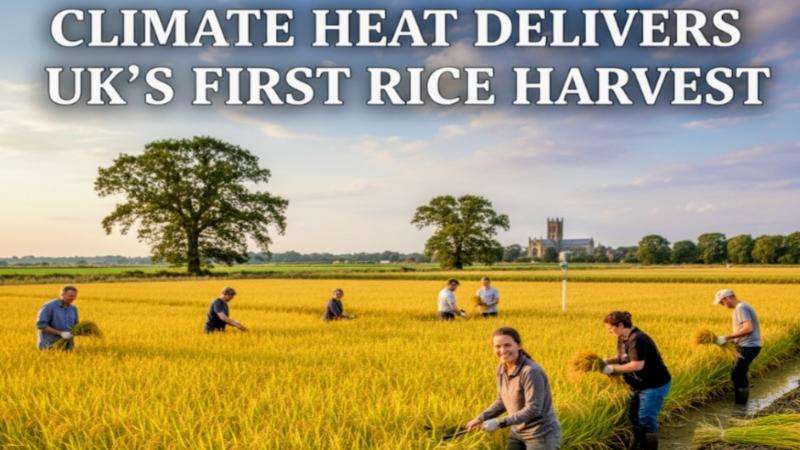An unassuming corner of the Fens near Ely has become the stage for a quiet agricultural revolution, as researchers from the Centre for Ecology and Hydrology (UKCEH) announce the successful harvest of the UK's first-ever rice crop. Grown across small, newly created paddy fields, the nine varieties of rice—including types originating from as far afield as Brazil, Colombia, and the Philippines—have flourished, buoyed by the country’s hottest summer since records began in 1884, Daily Dazzling Dawn understands.
Nadine Mitschunas, the award-winning ecologist leading the pioneering study, admits that when she tells people she's growing rice in the UK, the reaction is often disbelief. "Nobody has tried this before," she says, "but with climate change, we have crops that 10 years ago, we wouldn't have thought would be viable. In 10 years time, rice could be a completely perfect crop for us."
A Changing Climate Opens the Door-The initial success of the trial, where the rice plants have been described as "big, happy, bushy," suggests that a rapidly warming climate is shifting the boundaries of what can be grown in the UK. Historically, the British climate was deemed too cold and lacking the consistent prolonged sunshine required for rice cultivation. However, the extreme summer temperatures and sufficient water supply in the Fens' rich peaty soil have provided a suitable environment for the exotic grain.
Professor Richard Pywell, also from UKCEH, cautions that Britain is still right at the "edge of rice’s range," making commercial planting a significant business risk for farmers right now. The UK's current agricultural landscape, which saw significant reductions in wheat and oilseed rape yields in 2024 due to challenging weather, underscores the volatility farmers face. Yet, continued warming could make rice a viable crop at scale within the next decade. The UK rice market is already substantial, estimated to be worth over £1 billion annually, and a domestic supply could bolster food security and reduce reliance on imports.
Beyond Food: A Climate and Conservation Triple-Win
The rice trial offers benefits that stretch far beyond the dinner plate, specifically concerning the UK's vital peatland ecosystems. The Fens, a region that produces over a billion pounds' worth of vegetables, are built on peat which began to be drained in the 17th century. This gradual drying causes significant carbon dioxide to leak into the atmosphere.
The new trial paddies require the land to be re-wetted, a process that could reverse this carbon loss by locking CO2 back into the soil. Initial results from the trials indicate the rice crop is not producing more methane—a potent greenhouse gas often associated with flooded paddies—than the carbon it helps sequester, suggesting a potential for low-emission cultivation in this context.
Furthermore, conservationists are enthusiastic. Wetland habitat has seen a dramatic decline in the UK, with some 90% lost in the past century. Leading curlew conservationist Mary Colwell points out that the critically endangered Curlew—a once common bird—utilises rice fields in other regions for foraging and as stopover points during migration. Introducing paddies could therefore create valuable new habitats.
The Road to Commercialisation-Despite the successful harvest, which will take place in October, the UK-grown rice will not be hitting supermarket shelves immediately. The next stages involve rigorously testing the yield, refining the growing process for efficiency, and addressing practical challenges.
East Anglian farmer and conservationist Graham Denny remains sceptical, citing the immediate economic struggles of current UK farming and the risk posed by potential pests. “What are you going to do when 10,000 geese land on those paddy fields?” he asks, highlighting the need for thorough risk assessment before any large-scale commercial venture.
Nonetheless, for Nadine Mitschunas and the UKCEH team, the first harvest is a landmark success, planting a literal seed of possibility. It demonstrates that with the accelerating pace of climate change, the UK’s agricultural sector must embrace unconventional thinking to secure a diverse and resilient food future.
The UK is overwhelmingly reliant on international trade for its rice supply, importing approximately 650,000 to over 700,000 tonnes annually, making the domestic market worth over £1 billion. While around 90% of UK households buy rice, consumption is significantly driven by the nation's diverse culinary landscape, with South Asian (Indian, Pakistani, Bangladeshi) and East Asian (Chinese, Thai, Japanese) communities consuming it most frequently as a staple food. This dependence highlights why the success of the Cambridgeshire trial is a major step toward building food resilience and security.








.svg)

_8.jpg)
